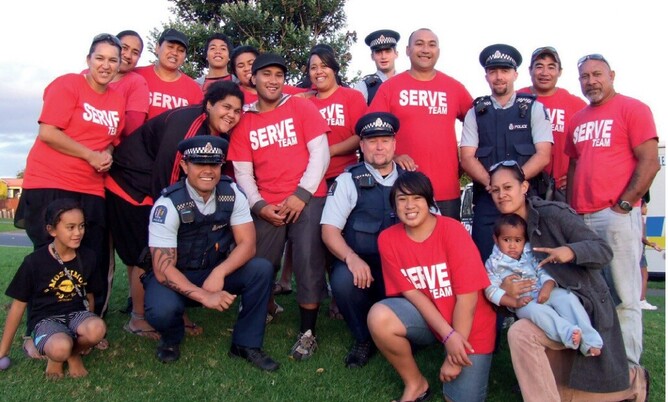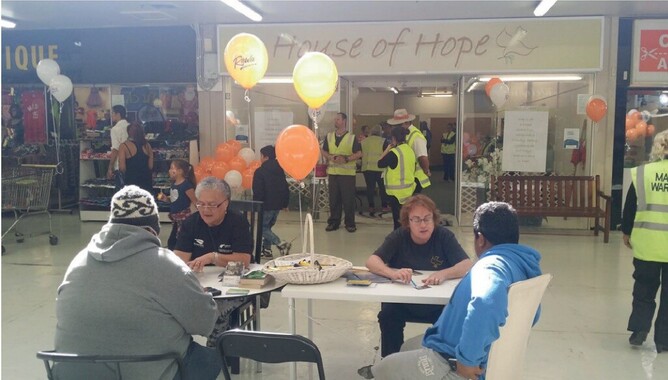Pastor Lui Ponifasio, LifeChurch Manurewa
As pastor of Life Church Manurewa, Lui Ponifasio has clear understanding of the church’s role in the world: we do as Jesus did. “It’s the incarnational model of Christianity. When Father expressed His heart to the world, He didn’t just say ‘I love you.’ He demonstrated it by sending Jesus. It was love you could see and touch and feel.”
For Lui and his people, the next bit is the kicker: “As the Father sends me, I send you.”
“Everything flow from that. As Christ’s followers, we are called to show love and the gospel. We cannot just talk about it. But there’s also a balance: we can’t just be into social justice: we must proclaim the gospel as well. You have to have both.
“As leaders, our job is to empower God’s people to live loving, truth-telling lives. Yes, they are rooted in their faith and rooted in the church. But the fruits of that faith must show in the community. We have a saying: ‘No one is attracted to roots. People are attracted to fruits.’ We are deeply committed to that truth.”
For the last 12 years, the believers at Life Church Manurewa have been actively living it out. But how did they get like this? How did this church-wide ‘loving-the-community’ start?
Lui recalls the journey.
“Loving the community must be on the heart of the leader, to the point of modelling love for the community for others to see.
Vision is also important. When it comes to loving the community, define the WHY more than the WHAT. It’s more important that believers know why they should love their neighbourhood more than knowing what form that love should take. Share the vision with passion. Share it with your leaders and keep talking about it with the groups.”
When Life Church relocated to Manurewa in 2007, there were already many churches in the community. The question Lui asked was ‘How can we do church differently?’ “I said to my people, let’s go out into the community, prayer-walking the streets and listening to God. As we pray, we will see the community from God’s perspective. Look for clues about the community’s needs. You’ll learn about them from their houses and their lawns. If we are to love these people, we’ll need to know them.”
One obvious sign of need was the broken bottles strewn everywhere. Lui and his people quickly realised that their community had a problem with alcohol. But what does a church do about that?
“We started with something practical within our reach. For us, that meant gathering as a church every Saturday morning at 7am to go out and clean up the streets. We picked glass and rubbish from skate parks and footpaths. Everywhere we found it.
“When the community people saw what we were doing, they asked us about it – why were we cleaning up someone else’s mess?
We then saw an opportunity to get the community working alongside us. We spoke to primary schools and organised for the kids to tell their parents ‘On Saturday, we’re going to have a big clean up. Join us.’ And they did. We had God’s people and the community working shoulder-to-shoulder.”
To better understand, Lui paid a visit to the local Community Liaison Officer. “I said to him: ‘I don’t know anything about the community. Can you help me connect?’ He gave a list of all the key people: school principals, Kaumātua, police officers, the president of the Business Association, the mall manager. I went and visited them all (with chocolate cake!).
“To love your community, you have to make that kind of effort. The fish won’t jump out of the sea onto your lap while you’re on the sand. You have to fish on their terms. If we do, the rewards are great. From that list and those meetings, dozens of opportunities opened up for me and my people.”
Like befriending the Manurewa police force.
In 2008, a series of incidents put the police under pressure. A liquor store owner was killed on a Sunday. A taxi driver was robbed on Monday. A dairy owner was held up with a machete on Wednesday. As a result, the full force of media scrutiny and blame was levelled against the police. ‘Useless’ was how the community described them.
Lui took a completely different approach.
“On Sunday, I got up to preach and said: ‘God calls us to be different. These police officers are real people. They have families of their own, yet they are risking their lives. This coming Wednesday, we are marching down to the Police station. It will, look like a protest, but we’ll bring food and support.
“For my part, I brought certificates of appreciation for each officer. We got the young people to make signs that read ‘Manurewa police. You are our heroes’ and ‘We love Manurewa Police.’ When we knocked on their gates, the police were expecting the worst. But we showed them nothing but love and support.”
Some of the officers were in tears. “The Area Commander came up to me and said, ‘I have been a police officer for 30 years. This is the first time I have felt appreciated.’ Another told me that he was about to resign because of the pressure, but our show of support had changed his mind.”
Two years later, Lui was invited to be the official chaplain of the Manurewa police force.
Over the years, Life Church Manurewa has reached into their community in all manner of practical ways. They led the schools and wider community into a Working Bee called PAINT OUT. The aim was to eliminate every trace of graffiti from Manurewa in a single day. With the support of the Manukau Beautification Trust, they accomplished their goal. They’ve also instigated the closure of numerous liquor outlets in Manurewa. To get the ball rolling, Lui took it upon himself to take photos of every liquor outlet in Manurewa. He then took these photos to local leaders and politicians, along with submissions for an investigation. A formal study was carried out which officially recognised the disproportionate number of liquor outlets for Manurewa’s population.
“This local support helped give our church the mandate to protest when new liquor shops opened. When a new outlet was proposed, our people rallied around the site and protested to have the development shut down. We often succeeded.”
Lui’s people also partnered with Countdown to distribute soonto-be-expired bread to local people. Some came to believe in Christ as a result. Others learned that the one place you could go in times of trouble was Life Church.
From the relationship Lui had developed with the mall manager, Life Church was able to partner with two other churches to set up a drop-in centre within the actual mall. HOUSE OF HOPE became a place where locals would come to hang out, drink coffee, and share about the issues of life. Lui recalls one special encounter. “After coming along to our House Of Hope, a particular woman started coming to our church on Sunday. She then gave her heart to God and died four weeks later.
“As leaders, we sometime think ‘How can I get bums on seats on Sunday?’ It’s okay to want that, but we’ve got to love the people who are not coming to church. We have to go to them, as Jesus came to us. It’s not a programme; it’s a way of life.”
As the Father sends me, so I am sending you.




